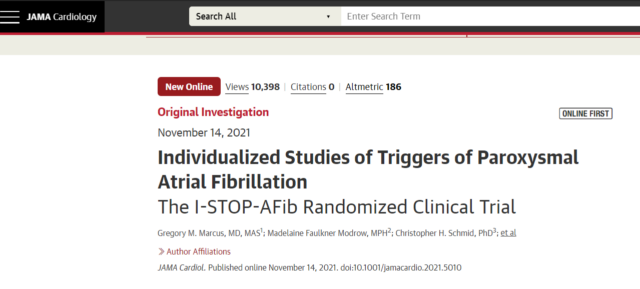Alcohol | Coffee | Lack of Sleep: Which will increase the onset of arrhythmia?
- Normal Liver Cells Found to Promote Cancer Metastasis to the Liver
- Nearly 80% Complete Remission: Breakthrough in ADC Anti-Tumor Treatment
- Vaccination Against Common Diseases May Prevent Dementia!
- New Alzheimer’s Disease (AD) Diagnosis and Staging Criteria
- Breakthrough in Alzheimer’s Disease: New Nasal Spray Halts Cognitive Decline by Targeting Toxic Protein
- Can the Tap Water at the Paris Olympics be Drunk Directly?
Alcohol | Coffee | Lack of Sleep: Which will increase the onset of arrhythmia?
- Should China be held legally responsible for the US’s $18 trillion COVID losses?
- CT Radiation Exposure Linked to Blood Cancer in Children and Adolescents
- FDA has mandated a top-level black box warning for all marketed CAR-T therapies
- Can people with high blood pressure eat peanuts?
- What is the difference between dopamine and dobutamine?
- How long can the patient live after heart stent surgery?
Alcohol | Coffee | Lack of Sleep: Which will increase the onset of arrhythmia?
Atrial fibrillation (atrial fibrillation) is the most common arrhythmia.
The US Centers for Disease Control and Prevention reports that the number of deaths caused by atrial fibrillation in the United States each year exceeds 150,000, and the mortality rate has been rising for more than 20 years. In order to better understand atrial fibrillation, researchers have also begun to explore the predisposing factors of atrial fibrillation.

Screenshot source: JAMA Cardiology
Recently, a study published at the annual scientific meeting of the American Heart Association explored the possible causes of common arrhythmias.
The study found that among the many factors that the study focused on, only drinking alcohol can increase the onset of arrhythmia, while factors such as caffeine intake and lack of sleep have no significant relationship with the arrhythmia.
The results of the study were also published in “JAMA Cardiology” (JAMA Cardiology).
The study included 446 patients with an average age of 58 years who had symptoms of paroxysmal atrial fibrillation.
Then all participants were divided into two groups, a single-case randomized control group (N-of-1) and a control group. In the N-of-1 group, all participants randomly selected one risk factor to intervene for 1 week at a time, with a total of 6 cycles.
The potential predisposing factors selected by the participants in the N-of-1 group in advance include drinking, drinking coffee, sleeping on the left side, lack of sleep, eating large meals, drinking cold drinks, eating a specific diet, exercise, dehydration, etc.
This process requires the use of mobile electrocardiogram equipment and mobile phone APP to fill in a questionnaire about the impact of atrial fibrillation on the quality of life (AFEQT), and record the possible impact of each influencing factor on atrial fibrillation.
Participants in the N-of-1 group can select the predisposing factors they think are most suitable for change through the 6-week intervention, and implement 4 weeks of lifestyle changes under the guidance of the investigator.
At the end of the 4 weeks, each participant must complete the AFEQT questionnaire again. Participants in the control group received only atrial fibrillation monitoring.
The primary outcome was the AFEQT score of the N-of-1 group; the secondary outcome was an atrial fibrillation event that occurred within the next 4 weeks.
Of all the participants, 320 (72%) completed the entire study. Overall, compared with the control group, the N-of-1 group had no significant difference in AFEQT scores within 10 weeks.
In other words, regardless of intervention, atrial fibrillation has similar effects on quality of life.
Compared with the control group, although the quality of life of the participants in the N-of-1 group did not improve in the last 4 weeks, the number of episodes of atrial fibrillation was reduced by 40% (adjusted relative risk RR=0.60, P< 0.001).
Further analysis found that only alcohol consumption was associated with a significant increase in the risk of atrial fibrillation; while other potential predisposing factors had no significant relationship with the number of atrial fibrillation attacks.
The first author of the study, Professor Gregory M. Marcus, Department of Cardiology, University of California, pointed out: “Although caffeine is the most commonly considered influencing factor, our study did not find a relationship between caffeine intake and atrial fibrillation.
In contrast, drinking alcohol is the only cause that has significantly increased the number of episodes of atrial fibrillation.”
The paper also pointed out the limitations of the study, such as the use of mobile ECG equipment for participants, which may reduce the sensitivity and specificity of atrial fibrillation.
Although there was no difference in the main results between the two groups, the results of this study did not prevent follow-up researchers from continuing to explore the impact of related incentives on atrial fibrillation.
It is hoped that current research can provide experience and inspire future research to help patients obtain clearer results.
The paper concluded that: the study did not find clear evidence that changes in the underlying predisposing factors by participants can improve the quality of life of patients.
However, compared with the control group, alcohol intake is related to the short-term frequency of atrial fibrillation.
People can reduce the risk of atrial fibrillation by avoiding specific triggers.
Reference:
[1] Gregory M. Marcus et al, Individualized Studies of Triggers of Paroxysmal Atrial Fibrillation, JAMA Cardiology (2021). DOI: 10.1001/jamacardio.2021.5010
Alcohol | Coffee | Lack of Sleep: Which will increase the onset of arrhythmia?
(source:internet, reference only)
Disclaimer of medicaltrend.org
Important Note: The information provided is for informational purposes only and should not be considered as medical advice.



